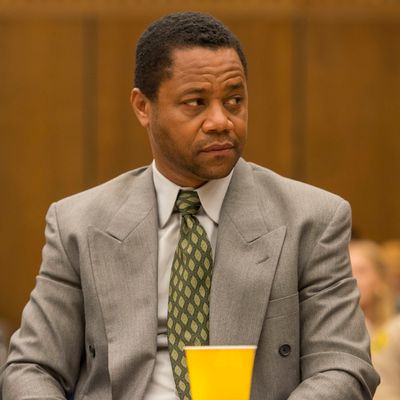
FX’s new limited series, The People v. O.J. Simpson: American Crime Story, takes us through the 1994–1995 criminal trial assessing football star turned Hollywood icon O.J. Simpson’s guilt or innocence in the murders of his ex-wife, Nicole Brown Simpson, and her friend Ronald Goldman. We’re walking through all ten episodes with author, magazine editor, and UCLA communication-studies professor Jim Newton — who was the Los Angeles Times’ lead reporter for the duration of Simpson’s arrest and trial — in an effort to identify what People v. O.J. handles with care versus when it deviates from documented fact and common perception. The intention here is less to debunk an explicitly dramatized version of true events than to help viewers piece together a holistic picture of the circumstances surrounding Nicole’s and Goldman’s murders and O.J.’s eventual acquittal. In other words, these weekly digests are best considered supplements to American Crime Story, rather than counterarguments.
Below are Newton’s insights into the veracity and potency of events and characterizations presented in “A Jury in Jail” (read his take on episode seven, “Conspiracy Theories,” here). Plus, a special addendum to last week’s discussion regarding the glove demonstration.
What They Got Right
The Juror Revolt
“I do remember that day when they all came in in black clothing,” says Newton, though he shares that he and his peers were not privy to behind-the-scenes jury machinations. “It was a big question: ‘What is the message they’re trying to send?’ I’d never seen anything like it. It was a very odd expression of juror discontent. The initial concern was it had something to do with the evidence or the lawyers. It turned out to be fairly tangential.”
Barry Scheck’s Dissection of Dennis Fung
“The Dennis Fung direct examination was the longest eight days of my professional life,” Newton recalls. “The cross [examination] was much more effective. Barry Scheck was much more experienced with DNA than anyone on the prosecution team. He knew how to use it constructively and poke holes in DNA evidence. In that sense, the show accurately captures his expertise with this kind of examination. The whole thing went from something that seemed very concrete to something much more vague than the prosecution intended. It was devastating. This was about the point in the case where it really seemed the prosecution was having monumental difficulties.”
Getting Mark Fuhrman’s Timeline Back on Track
“We became aware of the tapes right about this time in the proceedings,” confirms Newton, who reminds us that “it was already known he had used the N-word, because that was in the initial [Jeffrey] Toobin [New Yorker] piece. But the fact that he had talked at great length to this screenwriter and that it was on tape, that was a shocking surprise, and that came out in the summer of ’95. To the extent that we’re now going to get back into Fuhrman, it does put us back on the correct sequencing of how things came out.”
The Defense’s Fears of a Mistrial
“Conventional trial wisdom is that a mistrial’s good for the defense,” Newton points out. “It gives you a chance to see a bunch of evidence, to prepare yourself differently for the second time through. I suspect at the outset of this case, the defense would have welcomed a mistrial. But by this point in the proceedings, their hopes turned to acquittal. Suddenly, a mistrial was a bad outcome.”
O.J.’s Eagerness to Take the Stand
“I don’t think anyone, innocent or guilty, would relish the opportunity of having Marcia Clark bat you around for a couple of days,” says Newton. “Does that mean he didn’t want to? No. He’s a competitor. I think part of him wanted the opportunity. He liked the limelight. He liked to spar. He was very confident in himself. I would be surprised if he didn’t want to testify, but also, I would be surprised if once the defense felt like it was winning, they would want to put him on.”
What They May Have Taken Liberties With
F. Lee Bailey As Johnnie Cochran’s Voice of Reason
“I have a little bit of skepticism about whether Bailey would have been the cool voice putting the brakes on Cochran,” says Newton. “He always struck me as the most theatrical of the defense team. He’s obviously a very experienced lawyer, and they were all there to advise each other, so it’s possible he was the voice of caution, but it seems unlikely that Cochran would have needed that. It may just be that they needed to be in dialogue for the show, that they can’t have people just thinking, cause that wouldn’t be much to watch.”
Cochran’s Visible Courtroom Emotions
“When the juror they call ‘the demon’ is seated, there’s a picture of Cochran wincing,” Newton says, adding, “I really doubt Cochran would have shown that kind of emotion in front of the jury. He’s a very composed guy. I understand what they’re trying to convey, but he would have had too much composure to let that happen.”
About Last Week’s Bloody-Glove Demo …
Since last week’s recap was published, a source Newton describes as being close to the proceedings contacted him. “According to this person, Darden and Clark together approached the bench and told Ito they were going to ask Simpson to try on the gloves,” Newton says. “So the notion that she was taken completely by surprise, according to this person, is incorrect. And at that point, the defense objected, and Ito ordered a recess. It was during that recess that the defense requested the gloves be sent to them wherever they were meeting. Shapiro and/or Cochran — I’m a little vague on this point — put on latex under-gloves and tried them on and determined they wouldn’t fit Simpson. It was not done without supervision, but it was at that point they discussed they would withdraw their objection, and Simpson would be allowed to try them on in front of the jury.”

